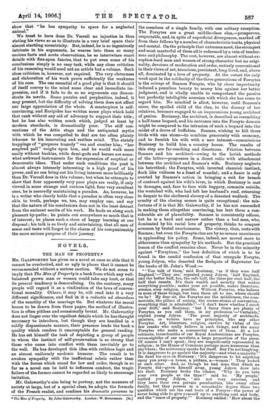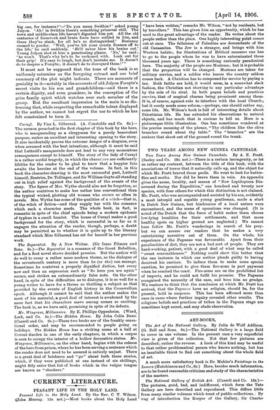NOVELS.
THE MAN OF PROPERTY.*
GALSWOETHY has given us a novel at once so able that it cannot be overlooked, and so ugly in places that it cannot be recommended without a serious caution. We do not mean to imply that The Man of Property is a book from which any well- balanced grown man or woman could take any hurt, or that its general tendency is demoralising. On the contrary, many people will regard it as a vindication of the laws of conven- tional morality. Others, it may be, will read into it a very different significance, and find in it a reductio ad absurdum of the sanctity of the marriage tie. But whatever the moral lesson to be drawn from these pages, the method of illustra- tion is often pitiless and occasionally brutal. Mr. Galsworthy does not linger over the repellent details which he has thought necessary to introduce, but though they are handled in a coldly dispassionate manner, their presence lends the book a quality which renders it unacceptable for general reading. He has set himself the task of depicting a group of people in whom the instinct of self-preservation is so strong that those who come into conflict with them inevitably go to the wall. He has developed this idea with ruthless logic and an almost uniformly sardonic humour. The result is to awaken sympathy with the ineffectual rebels rather than with the forces which stand for law and order, though in so far as a novel can be held to influence conduct, the tragic failure of the former cannot be regarded as likely to encourage imitation.
Mr. Galsworthy's aim being to portray, not the manners of society at large, but of a special class, he adopts the formula of the French realist, and confines his dramatis personae to
The Man of -Property. By John Galsworthy. London : W. Heinemann. [6s.]
the members of a single family, with one solitary exception. The Forsytes are a great middle-class clan,—prosperous, respectable, and, in spite of superficial divergences, marked off from their fellows by a number of characteristic traits, physical and mental. On the principle that extremes meet, the strongest and most masterful of them all is redeemed by a vein of tender- ness and philosophy. The rest, however, are almost without ex- ception hard men and women of strong character but no origi- nality, devotees of moderation and order, entirely conventional in their views of art, tenacious, persistent, long-lived, and, above all, dominated by a love of property. At the outset the only weak spot in the solidarity of the three generations of Forsytes is the maage of Soames Forsyte, who by sheer importunity induced a penniless beauty to marry him against her better judgment, and is wholly unable to comprehend the passive but perfectly intelligible aversion with which she has come to regard him. No mischief is afoot, however, until Soatnes's niece, the spoiled child of the clan, to the dismay of her relatives, becomes engaged to an impecunious young architect of genius. Bosinney, the architect, is described as resembling a half-tame leopard, and his entrance into the Forsyte domain might be compared to the intrusion of such a leopard into the midst of a drove of buffaloes. Soames, wishing to kill three birds with one stone—to combine generosity with economy, and to furnish his wife with a new interest—commissions Bosinney to build him a country house. The results of this step are far-reaching and disastrous. Friction between Soames and his architect—owing to the lavish methods of the latter—progresses in a direct ratio with attachment between the architect and Soames's wife. Bosinney neglects his betrothed ; the Porgies, with inverted clannish instinct, flock like vultures to a feast of scandal; and a fiasco is only averted by Soames's action in bringing a suit for breach of contract against his wife's lover, in which Bosinney is cast in damages, and, face to face with beggary, commits suicide, the wretched wife, wile had left her husband's roof, returning in despair to the sheltered slavery of a detested wedlock. The cruelty of the closing scenes is quite exceptional : the mis- fortune of it is that Mr. Galsworthy, if he has not succeeded in making them altogether convincing, has lent them a con- siderable air of plausibility. Soames is consistently odious, but he is a hard and narrow rather than a bad man, who, dominated by his racial love of property, thinks to conquer aversion by brutal uxoriousness. The victory, then, rests with Soames ; but even the Forsyte clan are by no means unanimous in applauding his policy. Some, indeed, are moved more to abhorrence than sympathy by his methods. But the practical lesson of the conflict remains clear. Never be in the minority against " Forsytism," the best definition of which is to be found in the candid confession of that renegade Forsyte, young Jolyon, who deserted the fleshpots of Bayswater for the husks of St. John's Wood :—
"'You talk of them,' said Bosinney, as if they were half England.'—' They are,' repeated young Jolyon, half England, and the better half, too, the safe half, the three per cent, half, the half that counts. It's their wealth and security that makes everything possible ; makes your art possible, makes literature, science, even religion, possible. Without Forsytes, who believe in none of these things, but turn them all to use, where should we be ? My dear sir, the Forsytes are the middlemen, the com- mercials, the pillars of society, the corner-stones of convention ; everything that is admirable !'—' I don't know whether I catch your drift,' said Bosiuney, but I fancy there are plenty of Forsytes, as you call them, in my profession.'—' Certainly,' replied young Jolyon. The great majority of architects, painters, or writers have no principles, like any other Forsytes. Art, literature, religion, survive by virtue of the few cranks who really believe in such things, and the many Forsytes who make a commercial use of them. At a low estimate, three-fourths of our Royal Academicians are Forsytes, seven-eighths of our novelists, a large proportion of the press. Of science I can't speak; they are magnificently represented in religion ; in the House of Commons perhaps more numerous than anywhere ; the aristocracy speaks for itself. But I'm not laughing. It is dangerous to go against the majority—and what a majority !' He fixed his eyes on Bosinney It's dangerous to let anything carry you away—a house, a picture, a—woman !' They looked at each other. And, as though he had done that which no Forsyth did—given himself away, young Jolyon drew into
his shell. Bosinney broke the silence. Why do you take your own people as the type ?' said he. My people,'
replied young Jolyon, are not very extreme, and they have their own private peculiarities, like every other family, but they possess in a remarkable degree those two qualities which are the real tests of a Forsyth—the power of never being able to give yourself up to anything soul and body, and the "sense of property." Bosinney smiled : • How about the big one, for instance P'-6Do you mean Swabia P' asked young Jolyon. ' Ah ! in Swithin.there's something primeval still. The town and middle-class life haven't digested him yet. All the old centuries of farmwork and brute force have settled in him, and there they've stuck, for all he's so distinguished.' Bosinney seemed to ponder. Well, you've hit your cousin Soames off to the life,' he said suddenly. He'll never blow his brains out: Young Jolyon shot at him a penetrating glance. No,' he said; he won't. That's why he's to be reckoned with. Look out for their grip ! It's easy to laugh, but don't Mistake me. It doesn't do to despise a Forsyte ; it doesn't do to disregard them !"
It must not be supposed that the tone of the book is so uniformly saturnine as the foregoing extract and our brief summary of the plot might indicate. There are momenta of geniality in it—notably in the accounts of old Jolyon Foray te's secret visits to his son and grandchildren—and there is a certain dignity, and even grandeur, in the conception of the grim family spirit which watches over each member of the group. But the resultant impression in the main is so dis- tressing that, while respecting the remarkable talent displayed by the author, we cannot but regret the use to which he has felt constrained to turn it.







































 Previous page
Previous page